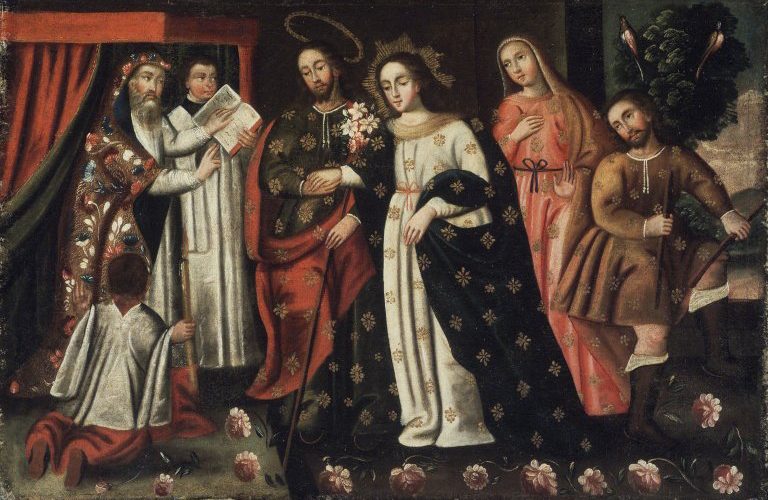By: Andrew Rudmann
Will you be my Valentine?
What do we really know about St. Valentine?
-
- There are apparently three St. Valentines who celebrate martyrdom on February 14th. One was a priest of Rome martyred in the third or fourth century.
- It is thought that Pope Gelasius I promoted a devotion to these three martyrs at the end of the 5th century in an effort to replace the pagan fertility feast, Lupercalia.
Though most of the lore surrounding the life of St. Valentine is not historically verifiable, the legends are still inspirational. The main legend holds that, in the third century, Emperor Claudius II promulgated an edict barring young men from marriage. This was based on the theory that men would be more fearless warriors if they did not have to worry about a wife and children at home. In opposition of this edict, and out of great faith and respect for the sacredness of the sacrament of marriage, St. Valentine began marrying young couples in secret. Eventually, Valentine was caught, arrested, and sentenced to death by beating. Legend or not, this story is a great example of a man, a priest, giving his life for the sake of love.
Before seminary, February 14th marked my busiest and most expensive week of the year. My girlfriend’s birthday was February 13th and our anniversary was February 17th. Oh, and once I accidentally told my entire family that her birthday was February 15th (from this moment on, she celebrated two birthdays). Therefore, the 13th, 14th,15th, and 17th were all equally important solemnities for us and, of course, there would be no consolidating. If I had suggested a consolidation, it would have been like telling a kid born on December 26th that Christmas would suffice for his birthday party – you just don’t do that.
I have always found it interesting that some men dread special events in dating life. For whatever reason, there is this false notion that it is more manly to complain and roll the eyes at these events. To be completely honest: I absolutely LOVED these events! The week of our February fiestas was my favorite week of the year! These celebrations gave me a perfect reason to go all out. And I mean, ALL OUT. Little notes everywhere, homemade cards, rose petals in her notebooks, cheesecake, awesome gifts, fancy romantic dates, basically everything that you have ever seen in a cheesy romance movie: I was all about it! Did I ever go over the top? Every time. But I didn’t care at all. I loved her so much and I wanted to express that love in every little corny way I could think of. Honestly, I could have done these things for her every day of the year. I never tired of loving her. In fact, I was often frustrated because I wanted to do so much more for her. I felt as though I had so much more to give, that I was only scratching the surface of my ability to love her. You may be thinking, “Why is this guy in the seminary?” Something I didn’t know then: this was actually a sign that God was calling me to celibacy.
Contrary to the notion that celibacy is a cause of the vocational crisis, for me it was the very mystery of celibate love that finally opened my heart to desire the priesthood. As I mentioned above, my greatest struggle in my relationship with my girlfriend was the tension of being deeply in love, yet never being able to express this love enough. I had a similar struggle in my job. I worked in a pharmacy at a free clinic, serving the poor and homeless. I helped many of these people, but I carried a deep sadness and frustration because, like with my girlfriend, I was so limited in my ability to love my patients. I was not satisfied with merely helping them in their medical needs, I wanted to enter deeply into their lives and care for each one of them as if they were my own child. This is the love of a priest. When I realized that the priesthood was not about giving up a spouse and family, not about a limited love, but rather about being a father to a gigantic family and an infinite capacity to love, I desired it more than anything in the world.
You see, people often misunderstand celibacy, thinking that it is unnatural, a lifetime of “not loving” someone, of not having a spouse or a family. In fact, celibacy is just the opposite. Celibacy is not unnatural, it is supernatural. Those who are called to celibacy are called to a greater love than is naturally possible. Celibates are given the supernatural grace to LOVE EVERYONE! Thus, my desire to love without reservation was actually a sign that God had given me a heart capable of this special love, this radical love. God had given me a heart with the capacity to totally give of myself, not to just one person or one family, but to all of God’s people!
In my first year of seminary, I had an unforgettable experience of this grace. Every year, the Archdiocese takes about 500 high school students to the March for Life in Washington DC. I was assigned to be the youth minister on one of the buses. As youth minister, I spent five days with the 45 high schoolers on my bus and we had an incredible time. I remember at one point, I looked down the bus and was moved with a deep love for each of my students. I realized that even 45 children would not satisfy my desire to be a father – I wanted more! It was as if this trip truly tested the waters of my heart for the first time and found them to be bottomless. This is the supernatural love of celibacy: not a limit on love, but a grace to love infinitely.
Yes, celibacy is a sacrifice, of course it is! But love is not possible apart from sacrifice. Christ tells us, “greater love has no man than this, that a man lay down his life for his friends” (Jn 15:13). Recall the legend of St. Valentine. His love for the young people, his love for the Church, triumphed over the love he had for his own life: he made the ultimate sacrifice! St. Valentine completely gave his life to Christ, so that young couples could give their lives to one another. This is the nature of celibate love – the celibate lays down his life in love for all people. I want to make this sacrifice too; I desire to lay down my life in love for each one of you. St. Valentine, pray for us!
About the Author: Andrew Rudmann

Andrew Rudmann is in Third Theology at Notre Dame Seminary.
Disclaimer
All opinions published by the authors on this blog are solely those of the authors. Although the goal is that they should, they do not necessarily express the views and opinions of the Archdiocese of New Orleans, Notre Dame Seminary, the Church, or their respective dioceses and bishops.
Notre Dame Seminary and the Archdiocese of New Orleans are not responsible for the comments of commenters, although every effort will be made to remove offensive comments.
If you should find an error or offensive content, please email the NDS Blog editorial team.

